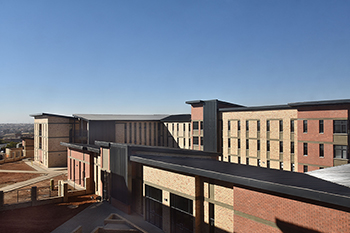Latest News Archive
Please select Category, Year, and then Month to display items
11 January 2021
|
Story André Damons
|
Photo Supplied
 Dr Ralph Clark
Dr Ralph Clark
The Afromontane Research Unit (ARU), the flagship research group of the University of the Free State (UFS) Qwaqwa Campus, has recently been granted R8,4 million to establish a Risk and Vulnerability Science Centre programme.
The Risk and Vulnerability Science Centre (RVSC) programme was established by the Department of Science and Innovation (DSI) as part of the Global Change Research Plan for South Africa and is funded by the DSI through the National Research Foundation (NRF). The RVSC will focus on the need to generate and disseminate knowledge about risk and vulnerability on global change challenges faced by local policy makers/ governance structures and communities in South Africa.
Invited to participate
Dr Ralph Clark, Director of the ARU, says the UFS, together with the University of Zululand and the Sol Plaatje University, has been invited to participate in Phase 2 of the RVSC programme. Dr Clark was approached by the DSI (on referral from the South African Environmental Observation Network – SAEON) in February 2020 regarding the potential for establishing a RVSC at the UFS Qwaqwa campus.
Subsequent interactions were held between the UFS and DSI, and in March 2020, the UFS formally accepted the DSI invitation. It has since been agreed that the RVSC: UFS will be hosted as a RVSC under the ARU umbrella, with dedicated personnel embedded at the UFS in this regard (internal processes and reporting) but reporting directly to the NRF regarding the RVSC.
Interest and support welcomed
Dr Clark welcomed this interest and support from the DSI-NRF, saying that the funds will further assist the UFS in growing its excellent and growing research portfolio and building more research capacity on this traditionally undergraduate-focused campus. “The RVSC will contribute to much-needed solutions in an area marked by major sustainability challenges and will assist in moving Phuthaditjhaba away from its negative apartheid history towards becoming a sustainable African mountain city,” says Dr Clark.
First residence for UFS South Campus
2016-09-01

The residence has 146 double rooms with 17 kitchens
overall, each corridor has one kitchen. The residence
also has a gazellie and a conference room that
can accommodate 50 people.
Photo: Charl Devenish
The South Campus of the University of the Free State in Bloemfontein now has its own student residence. Completed in June 2016, the new residence can accommodate 250 undergraduate and 20 postgraduate students.
The residence has 270 beds, with 20 single-bedroom flats and 12 additional single rooms in the corridors. Each of these single-bedroom flats has a kitchen, lounge, and a bathroom. There are 146 double rooms with 17 kitchens overall, each corridor has one kitchen. The residence also has a gazellie, a conference room that can accommodate 50 people, as well as eight laundry rooms with a drying area.
“Students at the South Campus have, up until now, been commuting from the Bloemfontein Campus and residential areas around town. We are extremely proud that accommodation will now be available to our students on the campus. Although the official opening of the residence is said to take place early in 2017, some students have already moved in,” says Prof Daniella Coetzee, Principal of the South Campus.
The residence was built at a cost of R57 million, which was funded by the UFS and the Department of Higher Education and Training.
Residence accessible to differently-abled people
The UFS strives to cater for differently-abled people by making all its buildings accessible to them. This residence is no exception, as it has two rooms available on the ground floor of Block C for differently-abled students. These rooms accommodate two students per room.
A one-of-a-kind newly installed water system
The residence is also the first at the university that has a grey-water system installed. Grey water is made up of bath, shower, and bathroom sink water. The water will then be reused for toilet flushing as well as for irrigation purposes on the campus.